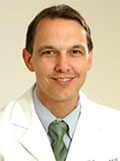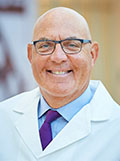 |
Kristoffel R. Dumon, MD is a Bariatric and Gastrointestinal Surgeon at Chester County Hospital. He was educated in Belgium, where he grew up, and did his initial training in Germany. His interest in minimally invasive surgery led him to the United States – and the University of Pennsylvania – in 1998.
|

|
Noel N. Williams, MD accepted an offer to leave his practice in his native Ireland to help establish the minimally invasive and bariatric surgery program at Penn in 1994. He is currently the Director of the Penn Metabolic and Bariatric Surgery Program.
|
What drew you to bariatric surgery?
DR. WILLIAMS: At the time, the system in Ireland was, you did six months of surgery followed by six months of medicine after you graduated from medical school. From that point, I taught anatomy for a year before going on to a formal surgical training program in Ireland, which brought me to the United States for two years. When I returned to Ireland, I was doing gastrointestinal surgery, much of it minimally invasive. Back then, the bariatric surgery program at Penn was all open surgery. The leaders of the program approached me and asked if I could translate my expertise in minimally invasive surgery to bariatric surgery. I've been at Penn, and doing bariatric surgery, ever since.
DR. DUMON: I did my first residency in Germany. It was focused on trauma surgery. I wanted to learn more about minimally invasive surgery, and at the time, there were more opportunities for that in the US. So I did a second residency in general surgery at Penn. While I was there, minimally invasive surgery was just beginning. Once I completed my residency I applied, and was accepted, for a newly established fellowship in minimally invasive and bariatric surgery.
Dr. Dumon, you're very involved in developing robotic techniques for bariatric surgery. Can you put into context just how much the field's evolved in recent years?
DR. DUMON: It's impacted virtually every aspect. Many people are familiar with staples and probably think they've been around for a long time, but they're a pretty recent development. And while it may seem like a small thing, replacing sutures with staples, it's dramatically cut down the duration of surgeries, which makes them safer.
Dr. Williams, your ties to Penn go back more than 20 years, but your presence at Chester County Hospital is recent.
DR. WILLIAMS: At the Penn Metabolic and Bariatric Surgery Program's primary location, the Perelman Center for Advanced Medicine in Philadelphia, and at our outpatient clinic in Valley Forge, Dr. Dumon and I were seeing a lot of patients from Chester County. We thought, rather than have them come all the way downtown for their surgery, why not make it available to them closer to home, along with their pre and post-operative care? The opening of the new, state-of-the-art operating rooms at Chester County Hospital motivated us to finally act. We're able to offer robotic surgery here, and the inpatient rooms are pretty spectacular.
What parts of your tenure at Chester County Hospital have you embraced the most?
DR. DUMON: The level of patient care. There's a very collegial, patient-focused atmosphere here. Chester County Hospital has done an incredible job creating state-of-the-art facilities. The operating rooms, for example, are outfitted with the newest technology, including robotics. At the same time, the care provided here is very personalized. You walk in, everybody smiles. Everybody seems to know each other. It's a close-knit community. It's the most attentive and innovative care center in the region.
DR. WILLIAMS: One of our top priorities in establishing a comprehensive bariatric surgery program at Chester County Hospital was patient safety. We've worked hard to achieve a certain standard at the Hospital of the University of Pennsylvania. We were able to duplicate that here without any difficulty because the administrators and staff are dedicated to it as well.
What do you consider the most challenging aspects of your work?
DR. WILLIAMS: Bariatric surgery, by nature, can be very challenging. Patients can have a lot of health complications related to their obesity, such as sleep apnea, heart disease, or diabetes. Before we even reach the point of their surgery, we need to make sure we're addressing all of that and putting our patients in the best possible position before and after their surgery.
DR. DUMON: Unlike most kinds of surgeries, bariatric surgery isn't fixing an immediate problem. Instead, it's a significant piece of a long-term process that's designed to improve the patient’s health, their quality of life, and, ultimately, their longevity. But there can be a lot of complexity, medically speaking, in navigating the periods before and after the surgery, not to mention the surgery itself.
How about the most rewarding part?
DR. DUMON: The long-term outcome. Seeing my patients evolve and get a second chance at life. As far as we've come as a society, obesity is still stigmatized. It's still largely considered a personality trait. So I appreciate being able to tell them in our initial conversation, "Listen, this is 99 percent biology. We can help you." And then seeing them thrive through the process. It's a privilege to be able to provide this to my patients.
DR. WILLIAMS: When people undergo surgery like this, it changes their lives. They can play with their kids. They can travel without difficulty. Knowing that, it puts their progress in perspective. At the first follow-up after their surgery, they'll have already lost 20, 30 pounds. And then a year later, they've lost 100, 150 pounds. It's very satisfying to have a part in that transformation.
How conscious are you of your bedside manner?
DR. DUMON: I try to be very patient-centric and approach each person as a unique individual. I believe I'm at my best as a surgeon when I'm able to make a connection to my patient. Everyone’s life story is different. Being able to connect to that is a very important aspect of providing the patient with the surgical care they need.
DR. WILLIAMS: I was taught very early in my medical training that being able to meet your patients where they are early in their care is critical. I spend a lot of time engaging my patients. I want them to tell me about themselves, and I want to make sure I'm clearly explaining what I'm going to do in the operating room. Part of that is mentioning potential complications. I usually present them like this: "I'm telling you this, that it could happen, but I'll also tell you ways to make sure it doesn't." That helps foster confidence, which is an important part of the patient-doctor relationship.
Is there a patient who resonates with you?
DR. WILLIAMS: Yes. It's actually someone from the Chester County area. He underwent surgery some years ago and became an ambassador for our program. He heads a lot of our support groups, too. Back then, he weighed more than 400 pounds. Today, he's just over 200. He completely changed his lifestyle. His transformation has been incredible to witness, but, to be honest, he's one of many.
DR. DUMON: I had a patient who was on dialysis and the waiting list for a kidney transplant, which made her higher risk than most morbidly obese people who undergo bariatric surgery. At the time, our program didn't have much experience with patients like her, but we proceeded with her surgery. Not long after it, she was able to receive a kidney transplant because her weight had fallen to a healthier range, a prerequisite of the transplant. I saw her again very recently. She'd lost even more weight, and she was so excited!
What's the most valuable thing you've learned during your career so far?
DR. DUMON: Humility. I'm constantly meeting new people, and I'm noticing the challenges they have in life. Their challenges are often much greater than what I can do for them. Being a doctor is incredibly rewarding. Not a day goes by where I question what I'm doing with my life. But it's also very humbling.
DR. WILLIAMS: To be compassionate to my patients. I try to always make sure it's at the forefront of my care, to understand what they're going through so I can put myself in a position to meet their needs throughout our relationship.
For More Information: